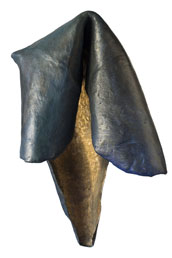A.E.:Paris has served an important inspiration for many an expatriate writer – James Joyce, James Baldwin, Rene Maran and so on. Its famous Latin quarter has provided a home for a meeting of international literary minds from Europe, America, Africa and Latin America. The literary importance of Paris is reflected in Walter Benjamin’s referring to it as the ‘cultural capital’ of the 19th century. It is also a “literary capital” in David Damrosch’ recognition of its excellent publishing infrastructure. How did Paris influence your writing?
A.S.: Although I had written for a year in a parking lot shack back in Canada, Paris was the place that really taught me to write. Each day I prepared my English lessons on the train to Versailles, and on my way home I wrote my stories and then polished them on weekends. I took these stories to the editors of Paris Voices, and then, later, with those same editors, I read the stories of others, searching for that indefinable spark that showed talent. Because we were young, we wanted a formula that could be applied to all literature, but soon we realized the spark was not subject to the hard rules, like the rules of my chemist mother. I got into the production of literature in Paris and got my hands dirty. I even folded by hand the signatures that became the pages of our journal. I worked the guillotine that trimmed the edges. I hawked the journal in bookstores. A turning point came in Paris when a Canadian journalist named Boyd Neil asked me who my favourite Canadian writers were and I did not have any. My ignorance was revealed to myself. I was appalled at myself and needed to do something about it.
A.E.:Would you say literary journalism – I refer to your time with Paris Voices and Descant – was a useful apprenticeship towards becoming a writer?
A.S.: My literary journalism therefore continued in Canada. I returned and bought every single literary journal for sale in the old Long House Bookstore, which specialized in Can Lit. I read them all and chose two I thought I might be suitable for: Descant and Exile. I wrote to both, and Karen Mulhallen at Descant wrote back. She agreed to take me on. There I learned under the tutelage of Russell Brown and Donna Bennett how to read closely. I carved a suckling pig for a celebration attended by Denis Lee and Margaret Atwood and Michael Ondaatje. We laughed and drank a great deal. Karen asked M T. Kelly to take me under his wing, and he introduced me to the readings at Harbourfront, then run by Greg Gatenby. I learned about the culture of writing in this country. And because of Descant, I could branch into writing literary journalism for other places, such as the Globe and Mail, CBC radio, and later television and other journals. As well, I branched further into nonfiction writing, which turned out to be a lot of fun because it permitted me to express my whimsical side.
A.E.:You manage a writing school. You never took a creative writing degree or course as far as I know. And neither did many a first class writer. Do you think it is possible to teach someone to write?
A.S.: I did indeed take two creative writing courses in university and I would have taken more had they existed. But, oh dear. This is one of the few questions that I find irritating. I always turn the question around to ask why we ask it of writing when we ask it of nothing else. We teach art, music, hockey, physics, and many more things. Why should writing be impossible to teach? Is it because we believe God speaks through the pen of a writer? But how can we believe such a thing in godless times? We don’t even believe in muses. Maybe we believe in talent. But there are plenty of hockey schools and not many Wayne Gretskys. Should we eliminate the hockey schools? Let me ask the question: why should writing not be possible to teach?
A.E.: Definitely we cannot eliminate hockey schools and so on. One can easily argue that hockey and literature are different in the sense that writing, creative writing that is, is a very subjective activity. I do agree that teaching the writing as physical inscription should be possible – that is teaching the physical, grammatical aspect of writing, the forming of sentences and their joining together, the details of plot, characterisation and so on; types of poetry and its different forms; so from a purely formalist aspect, yes. But some argue that it takes much more to make a creative writer. This is what the dissenters mean when they question the teaching of writing. They think teaching writing is trying to domesticate the creative spirit, and there are those who think that you cannot make a writer out of someone who does not already have the talent in some form or the other. Surely you do expect some talent in those who come to writing school?
A.S.: But I continue to protest the question. If we eliminate sports, let’s ask how a writer different from an artist or a musician. Of course one teaches the formal aspects and of course the end result is not the same as a Coke bottling plant where every drink comes out tasting the same. It all depends on the luck talent, and persistence of the writer (artist, musician). But how is this writerly experience different from anything else? Why should writers alone be self-made geniuses? Is this not a romantic conceit? And why do we cling to it when we have cast off so many other romantic conceits? Where do most jazz musicians learn their music now? At school. So do most gallery artists. Furthermore, the myth of the uninfluenced genius is dangerous because it leads us to believe that some sort of raw, “natural” talent exists in the wilderness, or that writing schools domesticate genius. The opposite is true. Most writers chosen by Granta for a 2007 “best new” came from writing schools. I see a few hundred writing school applications every year and the quality of them has been rising. I think it is because of a high school course called “Writer’s Craft”. Occasionally a wild young person approaches me (invariably male) to show me his startling new manuscript, something he wrote without reading anything because he did not want to be “influenced.” I have never seen one that was close to publishable. Peter Carey addressed the myth of the wild genius in his novel, My Life as A Fake, based on a hoax in an Australian literary journal. A couple of academics faked a “natural” poet and let him be discovered by a journal desperate to show unvarnished genius. The journal editors still believed in lone wolves, and this romantic belief led to their humiliation when the hoax was revealed. Literature is a conversation. One can enter it by reading a great deal and practising in solitude or by going to school. The same is true of music, by the way. Of course you can do it alone as long as you are connected to the conversation. You can learn almost anything alone, but most people learn with the help of manuals, teachers, and samples. I therefore repeat, why should we keep asking if writing can be taught? Of course one cannot teach genius. You cannot teach someone to be Renee Fleming or Constantin Brancusi, but each of them went to school. Arguably, the lone genius is easier to find in the world of art, where someone like Basquiat can appear. But he was studying images around him. The same conditions do not prevail for literature because literary texts do not “lie around” as images do in society. Of course you don’t have to go to writing school (but you do have to read a lot). I recently completed a study that showed 51% of writers published in prose in Canada in the last two decades did not go to school. But flip this number over. 49% of published writers did go to school. By my very rough estimation, about 5,000 students have gone through our writing school in the last nineteen years. Of those, over 280 have gone on to publish books in the traditional manner. Many more have self-published or published articles. That’s what, about one in seventeen or eighteen who has published? Now ask any publishing house how many over the counter submissions are published. I suspect the numbers are far, far worse.
A.E.:Does teaching or overseeing the teaching of writing enhance or interfere with your own praxis as writer?
A.S.: The conflict is not so much between teaching and writing; it is between solitude and the hurly burly of society. Everyone knows you need solitude to write. You must not get distracted. Doris Lessing says you must be slightly bored to write. Some writers are reclusive, inhabiting this private space all the time. I am not one of them. Once I have been alone for a few hours, I need to step out into society. I want to drink wine and talk and laugh and go to the marketplace to find excellent fish to be cooked at home. I want someone to eat that fish with me. But there are a couple of dangers in working a day job in the same world as the one I inhabit when I write, of being involved in both writing and teaching it, in criticism. One of them is that I am constantly aware of the “buzz” value of every writer. I am like a publicist in this respect. But being aware of buzz is not healthy because one keeps measuring one’s own buzz value. Let’s face it, most writers buzz for very short periods of time. I have just come out with a new novel so I have seen myself in half a dozen newspapers and as many blogs. But a year from now, others will be in those pages. Also, many writers, especially ageing writers, are in danger of getting embittered because they see others rising above them. This sort of bile is a stench I have whiffed at many literary events. One must try very hard not to smell bad oneself. One tries to take the high road, but one finds one’s own flesh is as weak as the flesh of others. Luckily, most embittered writers cannot stand the “literary scene” any longer and drift away. On the other hand, because I have to blog for my writing school, I am desperate for material and I post about who is doing what at literary events. We really need a Samuel Pepys of the literary scene here. I’m not that person, exactly, but all societies are amusing and literary society is so full of striving that it is particularly funny. But each writer is different. I have a weakness for narrative well-told. I would like to write a novel, but I would also like to read yours if you have written one. Therefore, when I go out into society, I am having fun. When I tire of it, I retreat to my solitude.





No Comments so far ↓
There are no comments yet...Kick things off by filling out the form below.